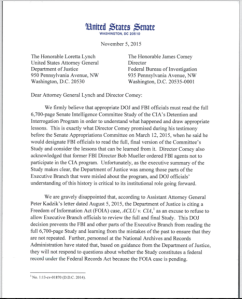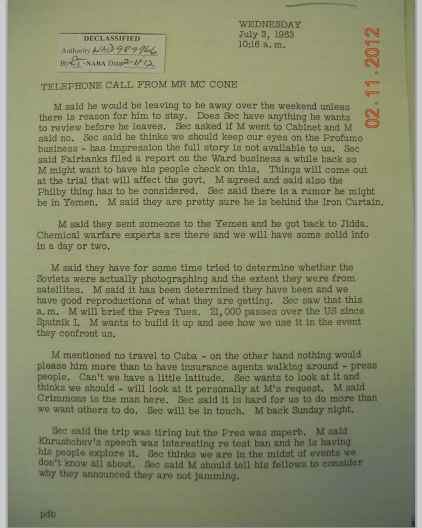DOJ Tells Archivist Not to Do His Job; Govt Argues OLC Memos both Authoritative and “Pre-Decisional”, and Much More: FRINFORMSUM 11/12/2015
The Presidential and Federal Records Act Amendments of 2014 gives the Archivist of the United States the binding legal authority to determine whether or not something constitutes a federal record. This clear delineation of the Archivist’s authority raises serious questions about the Department of Justice’s instruction to NARA that it not make precisely this determination about the Senate Intelligence Committee’s report on the CIA torture program. Senators Dianne Feinstein (D-Calif.) and Patrick Leahy (D-Vt.) revealed the DOJ’s insistence that the Archivist of the United States not faithfully fulfill its vital function in a letter to Attorney General Loretta Lynch, in which the Senators protest the DOJ’s refusal to allow its own officials, as well as those of the Defense Department, the CIA, and the State Department, to read the report under the pretense that its status as congressional or executive branch record is unclear. Feinstein and Leahy’s letter notes that “personnel at the National Archives and Records Administration have stated that, based on guidance from the Department of Justice, they will not respond to questions about whether the Study constitutes a federal record under the Federal Records Act because the FOIA case is pending.” As national security law expert Douglas Cox said earlier this year, perhaps the Archivist of the United States, David Ferriero, “should get his boots on” both to ensure that this important record is preserved and to prevent the Justice Department from superseding the National Archives and Records Administration’s authority.
Two of the government’s foremost lawyers recently told attendees of the American Bar Association’s Standing Committee on National Security Law that agencies are shying away from requesting Justice Department Office of Legal Counsel (OLC) opinions in favor of seeking “informal” and unwritten advice out of concerns the OLC opinions will be sought under the FOIA. The CIA’s General Counsel Caroline Krass told the audience, and acting OLC head Karl Thompson confirmed her assessment, that FOIA has “served as a deterrent to some in terms of coming to the office to ask for a formal opinion.”
The Brennan Center’s Elizabeth Goitein and the ACLU’s Brett Max Kaufman rebutted Krass and Thompson’s assertions in a series of postings for Just Security. Goitein argues that OLC memos cannot simultaneously constitute working law whose decisions are binding while remaining exempt from disclosure under FOIA’s Exemption 5 on the basis that they are “deliberative” and “pre-decisional.” Goitein suggests, “Perhaps the solution is simply to require the government to abide by its own characterization. If OLC opinions are to be given the status of deliberative documents and/or legal advice, so be it; but in that case, they cannot be binding on any agency or official, nor can they mitigate any official’s criminal or civil liability.” If the opinions are indeed authoritative, however, they are law and must be made available to the public.
In addition to questioning the existence of FOIA’s “chilling effect” on agencies requesting OLC opinions in the first place, Kaufman says that “For government lawyers to protest that they cannot do their jobs because their advice might one day see the light of day, allowing the public to hold them accountable for what they do in the public’s name, betrays an impoverished view of how our government is supposed to work. In passing FOIA, Congress did not ignore these lawyers’ concerns — it decided they were subservient to the value of transparency in our democracy.”
The government’s response to EPIC’s Supreme Court case concerning the Department of Homeland Security’s (DHS) “internet kill switch” policy – SOP 303 – is due on November 13. “EPIC has pursued public release of the government policy since BART subway officials shut down cellphone service during a peaceful protest in 2011.” EPIC won its district court case against DHS in 2013 when a federal judge ruled “that the DHS may not withhold the agency’s plan to deactivate wireless communications networks in a crisis… The federal court determined that the agency wrongly claimed that it could withhold SOP 303 as a ‘technique for law enforcement investigations or prosecutions.’ The phrase, the court explained, ‘refers only to acts by law enforcement after or during the prevention of a crime, not crime prevention techniques.’” The government appealed, and a federal appeals court reversed the lower court ruling.
The State Department has declassified a 1963 memo from Director of Central Intelligence John McCone to State Secretary Dean Rusk showing DCI McCone saying, “that the CIA had ‘good reproductions’ of Soviet satellite imagery.” The memo begs the question of whether the CIA had the capability to see what the Soviet satellites were seeing, and if so, how? Steve Aftergood, who highlighted the finding in a recent blog posting, notes, “Assuming the McCone statement is accurate, it would seem to imply one of a few possibilities. It could mean that the US was somehow intercepting the Soviet images (which seems improbable), or that it was replicating the images through US overflights, or else that it was simply modeling the images based on the presumed capabilities of the Soviet satellites and their orbital parameters.”

Jonathan Pollard: On the left is Pollards U.S. Naval intelligence I.D. photo, and on the right a 2012 photo of Pollard in prison.
President Obama will not waive spy Jonathan Pollard’s parole requirement to stay in the US under supervision for the next five years, despite Pollard’s – and his supporters’ – wish to see him go to Israel. The terms of Pollard’s sentencing after his 1985 arrest and subsequent conviction of spying for Israel made him eligible for parole this year, and the U.S. Parole Commission has already approved his Nov. 20 release. The National Security Archive published an Electronic Briefing Book (EBB) in 2013 on the Pollard case, which includes a declassified 1987 CIA damage assessment that details the specific subjects Pollard’s Israeli handlers requested he steal, including documents on Syrian drones and central communications, Egyptian missile programs, and Soviet air defenses.
Archive Director Tom Blanton recently discussed the above-Top Secret President’s Foreign Intelligence Advisory Board (PFIAB) report on the NATO nuclear release exercise Able Archer 83 – released to the Archie last month after a 12-year battle – with the New York Times. Blanton told the Times, “This new report is the first all-source assessment, as of 1990, and should clinch the debate: This is hugely important. This war scare was real.” The PFIAB found that the US “may have inadvertently placed our relations with the Soviet Union on a hair trigger,” among other sobering assessments. Blanton told the Times, “Turns out, 1983 is a classic, like the Cuban missile crisis, where neither superpower intended to go nuclear, but the risk of inadvertence, miscalculation, misperception were just really high. Cuba led J.F.K. to the test ban. Nineteen eighty-three led Reagan to Reykjavik and almost to abolition.”
Archive FOIA Project Director Nate Jones has led the Archive’s fight to help fill “an echo chamber of inadequate research and misguided analysis” on the War Scare, filing declassification requests for relevant information from US, Canadian, and British archives. While this effort has won the release of more than 1,000 pages of previously secret documents, it has also encountered needless and dubious secrecy from both sides of the Atlantic. Toby McIntosh’s ongoing reporting for FreedomInfo.org on rollbacks to the UK’s FOI administration is concerning for this and other historically important documentation projects.
NARA, in a little-known but very useful service, has preserved a one-time snapshot of agency web sites (sites ending in “.gov” or “.mil”) on or before January 20, 2001. NARA also captured federal web sites in 2004, and Congressional web sites in 2006, 2008, 2010, 2012, and 2014.
This week’s #tbt pick is a 2008 posting by Archive fellow Barbara Elias, and contains a dozen declassified documents on the US’s 1998 cruise missile strikes against al-Qaeda in response to terrorist attacks on US embassies in Kenya and Tanzania – and how they may have backfired.
Want to stay on top of the latest FOIA news? Click here to sign up for our weekly FRINFORMSUM email newsletter.
Happy FOIA-ing!




Trackbacks
Comments are closed.